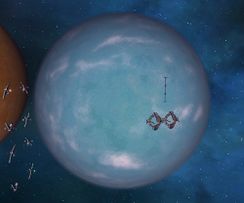Difference between revisions of "Planet Junyo"
(V4.85.3) |
(Removing pop numbers, no basis in lore) |
||
| Line 7: | Line 7: | ||
| sector = 4F | | sector = 4F | ||
| house = {{House Link | Kusari}} | | house = {{House Link | Kusari}} | ||
| − | | population = | + | | population = |
| docking = Yes | | docking = Yes | ||
| terrain = Water | | terrain = Water | ||
| Line 17: | Line 17: | ||
The planet Junyo was surveyed in 57 A.S., during the exploration of the [[Shikoku]] system by the famous Kusari explorer, Isao Yoshida, who named the planet after his ship, the Junyo Maru. It is covered almost entirely by a single deep ocean that remains liquid across the entire surface of the planet, due to the Shikoku system's young, hot sun. Despite being habitable for humans, the planet was largely ignored by the Kusari government, although a small number of settlers did relocate to the Ishizuki Plateau, a flat area of arable land that is the planet's only land mass. | The planet Junyo was surveyed in 57 A.S., during the exploration of the [[Shikoku]] system by the famous Kusari explorer, Isao Yoshida, who named the planet after his ship, the Junyo Maru. It is covered almost entirely by a single deep ocean that remains liquid across the entire surface of the planet, due to the Shikoku system's young, hot sun. Despite being habitable for humans, the planet was largely ignored by the Kusari government, although a small number of settlers did relocate to the Ishizuki Plateau, a flat area of arable land that is the planet's only land mass. | ||
| − | With the impending collapse of fisheries throughout Kusari in 630 A.S., Samura Industries purchased the planet from the Kusari government in an effort to begin terraforming Junyo's ocean using the recently discovered alien organisms from the planet [[Planet Kurile|Kurile]]. By 680 A.S., the ecosystem had been altered considerably; to such an extent that wide-scale production of [[Luxury Food|luxury foods]] was able to begin planet-wide | + | With the impending collapse of fisheries throughout Kusari in 630 A.S., Samura Industries purchased the planet from the Kusari government in an effort to begin terraforming Junyo's ocean using the recently discovered alien organisms from the planet [[Planet Kurile|Kurile]]. By 680 A.S., the ecosystem had been altered considerably; to such an extent that wide-scale production of [[Luxury Food|luxury foods]] was able to begin planet-wide. |
==Missions Offered== | ==Missions Offered== | ||
* [[Kusari State Police]]: $32,500 to $45,000 range | * [[Kusari State Police]]: $32,500 to $45,000 range | ||
Revision as of 09:59, 2 September 2011
| Planet Junyo | |
| Owner | Samura Industries |
| Location | 4F, Shikoku |
| Technical information | |
| Population | unknown |
| Docking | Yes |
| Terrain | Water |
| Diameter | 5,280 km |
| Mass | 3.89 x 10e24 kg |
| Temperature | 4°C to 46°C |
| Escape velocity | 8.83 km/sec |
The planet Junyo was surveyed in 57 A.S., during the exploration of the Shikoku system by the famous Kusari explorer, Isao Yoshida, who named the planet after his ship, the Junyo Maru. It is covered almost entirely by a single deep ocean that remains liquid across the entire surface of the planet, due to the Shikoku system's young, hot sun. Despite being habitable for humans, the planet was largely ignored by the Kusari government, although a small number of settlers did relocate to the Ishizuki Plateau, a flat area of arable land that is the planet's only land mass.
With the impending collapse of fisheries throughout Kusari in 630 A.S., Samura Industries purchased the planet from the Kusari government in an effort to begin terraforming Junyo's ocean using the recently discovered alien organisms from the planet Kurile. By 680 A.S., the ecosystem had been altered considerably; to such an extent that wide-scale production of luxury foods was able to begin planet-wide.
Missions Offered
- Kusari State Police: $32,500 to $45,000 range
- Samura Industries: $32,500 to $45,000 range
Bribes Offered
| Spoiler: |
|---|
|
|
Commodities
| Exports |
|
| Imports |
